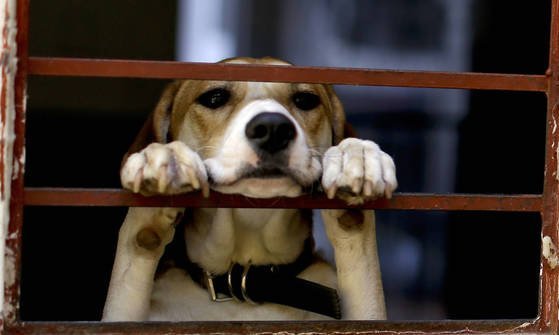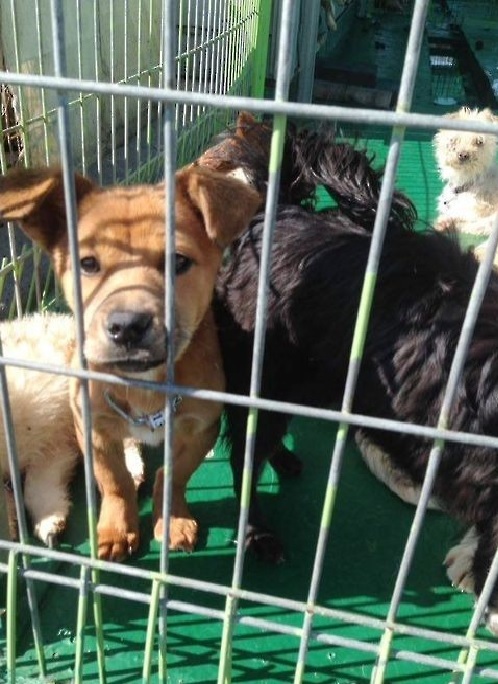Euthanasia of rescued dogs sparks debate on animal rights
By Ock Hyun-juPublished : Jan. 27, 2019 - 15:41
Cheong Wa Dae’s website saw more than 30 petitions, with support from 15,000 people, calling for Park So-youn of Coexistence of Animal Rights on Earth to be punished. Police launched an investigation last week into her after NGOs and animal rights activists filed complaints, alleging animal abuse and embezzlement.
Park is alleged to have killed more than 230 rescued dogs, even healthy ones, between 2015 and 2018, without the knowledge of most of the group’s staff or donors, despite the organization’s no-kill policy.
She did so to free up space at the group’s shelter so that CARE could go on more missions to rescue animals and appeal for more funds, the whistleblower claimed.

Park apologized for hiding the truth at a press conference, but claimed that what she had done constituted “mercy killing.” She euthanized only “a small number” of dogs because they were too sick to be adopted, she said, but hid it from the public because she was afraid of creating a stir. She did not specify the number of dogs involved but she did admit that she had administered lethal drugs directly, without a vet’s assistance, saying some of the dogs were afraid of vets.
Many donors who funded the group to stop the killing of dogs felt betrayed by Park, who had been hailed as a guardian angel for dogs at risk.
The news also raised questions over whether it was morally right for an individual to decide whether animals should be put down for their own good.
More fundamentally, however, the controversy surrounding Park is a reminder of the low awareness of animal rights and insufficient legal mechanisms to prevent animals from ending up in abusive situations, animal rights activists say.
Mass production of pets
Chae Il-taek, an animal activist representing the Korean Animal Welfare Association, admitted that it may be time to reflect on the tendency of the animal rights movement to focus on rescue operations.
The fundamental problem, he said, lies in the proliferation of more pets than society can accommodate -- an industrial structure that enables people to easily purchase dogs from pet shops and abandon them.
“The biggest task for the government is to make it difficult to buy and sell animals. Many people buy dogs irresponsibly and easily abandon them when they don’t need them anymore because they did not have respect for animals in the first place,” he said.
South Koreans typically buy dogs from pet shops rather than adopt from animal shelters as they tend to prefer purebred dogs. At pet shops, they can pick a dog of a certain breed, color and size. When shopping for dogs online, the prices are even lower.
While there are no official statistics, Korea is thought to have more than 3,000 dog farms, catering to the demand for dog meat and pets. Only 1,138 of them are licensed.
“We hope that the breeding and sale of dogs are banned in the long term. But if it cannot happen right away, the priority should be on efforts to prevent people from abandoning animals,” he said. “The Animal Protection Act is generous to animal abuse and killing.”
While people who abandon animals can face fines of up to 3 million won ($2,675), this provision of the law is not strictly enforced due to municipal budget and personnel shortages.
In light of shoddy enforcement and the failure to deter abandonment, coupled with low awareness of animal rights, animals continue to join the homeless population in large numbers.
According to government statistics, some lost or homeless 102,593 pets were admitted to public shelters in 2017, a 14.3 percent increase from the previous year. Of those, 30.2 percent were adopted and 14.5 percent were reclaimed by their owners, while 27.1 percent died in shelters and 20.2 percent were euthanized.
Under the Animal Protection Law, animals found at large are admitted to 293 public animal shelters, which are either funded by the government or run directly by municipalities. The shelters then post notices about the found animals on the government’s website. If the owners do not show up within 10 days, the shelters put them up for adoption. If they are not adopted, dogs are usually put down, as public shelters do not have enough money or space to accommodate a constant inflow of animals.
To rescue animals in danger of being euthanized, privately run shelters have stepped in. There are thought to be hundreds of privately run shelters across the country, such as those CARE operates.

Euthanasia of animals
Park said it was “inevitable to euthanize some dogs for their own well-being.”
But Chae said putting down animals due to lack of space or funds only perpetuated an endless cycle of killing.
Animal euthanasia is not illegal.
Under the rules for state-funded or state-run animal shelters, homeless animals can be euthanized only if they have incurable or contagious diseases or if they cannot be adopted. The decision must be made in consultation with veterinarians, and euthanasia must be administered by vets as well.
But this does not apply to privately run shelters.
Still, Chae‘s organization, which also runs a private shelter, refers to the state guideline. At least two veterinarians and several animal rights activists are involved in deciding whether to put an animal down in his organization, he said.
“If it is inevitable to euthanize animals, we should take into account medical elements and follow the rules strictly when making a decision,” he said.
Lee Hyung-ju, head of Animal Welfare Awareness, Research and Education, stressed the need for guidelines for the protection of homeless animals.
“There should be guidelines that stipulate the proper conditions for animal shelters so that private shelters can follow them,” she said, noting that the government does not even have data on the number of privately run animal shelters.
“Under the current law, we cannot clearly distinguish animal hoarding from animal protection.”
Therefore, the definition of “animal abuse” under the Animal Protection Act should be broadened to stipulate pet owners’ duty to guarantee minimal standards of welfare for animals, she said.
Under the Animal Protection Act, killing or injuring animals “without justifiable grounds” and selling captured animals constitutes animal abuse. Perpetrators can face up to two years in prison and fines of up to 20 million won.
Calls for tougher crackdown, regulations
To prevent animal abuse and abandonment, activists call on the government to make sure it is aware of the number of animals being produced, sold, abandoned and housed in public and private shelters.
Once it is armed with the data, the government should take action against animal abusers and irresponsible pet owners as a way of deterring further abuse and raising public awareness of the responsibility that comes with owning an animal, they said.
The government is conducting a study to identify the number and location of privately run animal shelters, as well as conditions for animals at the facilities. The study is to be completed in March.
“We are seeking to draw up guidelines or revise the existing act, taking into account the results of the study,” said an official from the Ministry of Agriculture, Food and Rural Affairs, who declined to be named.
“We are aware of (the increased) public awareness of animal welfare, so we will continue to make efforts to prevent animal abuse and animal abandonment.”
As part of efforts to improve animal welfare, the government tightened regulations on animal breeders under a provision that went into effect in March 2018. Breeders in the past were only required to register their businesses, but they must now obtain a permit to operate a breeding farm.
To prevent pet abandonment, the government established a registration system in July 2014 and required all pet owners to register dogs over 3 months of age. Some 1.17 million pets had been registered nationwide as of 2018, accounting for only about 20 percent of the estimated total population.
The Agriculture Ministry said it planned to devise a five-year plan to promote animal welfare this year.
By Ock Hyun-ju (laeticia.ock@heraldcorp.com)
-
Articles by Ock Hyun-ju











![[Today’s K-pop] BTS pop-up event to come to Seoul](http://res.heraldm.com/phpwas/restmb_idxmake.php?idx=644&simg=/content/image/2024/04/17/20240417050734_0.jpg&u=)
![[Graphic News] More Koreans say they plan long-distance trips this year](http://res.heraldm.com/phpwas/restmb_idxmake.php?idx=644&simg=/content/image/2024/04/17/20240417050828_0.gif&u=)





![[KH Explains] Hyundai's full hybrid edge to pay off amid slow transition to pure EVs](http://res.heraldm.com/phpwas/restmb_idxmake.php?idx=652&simg=/content/image/2024/04/18/20240418050645_0.jpg&u=20240419100350)

